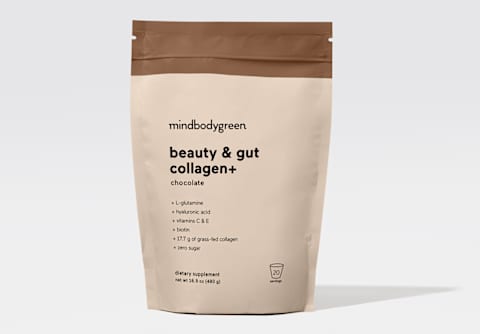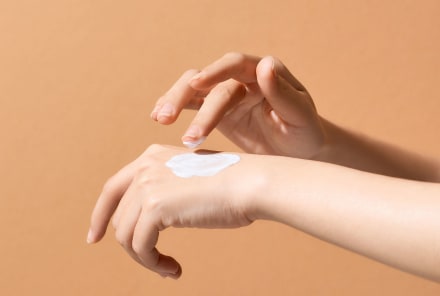Advertisement
The Two Nutrients That Really Matter For Beautiful, Glowing Skin



There are lots of good-for-you nutrients out there that will give you glowing, plump skin. And you should be getting your fill of a diverse range of them—but when it really comes down to it, there are two you need above all else to make your skin look stunning. What are they? Collagen and vitamin C. Both are beneficial on their own, but together they work synergistically in the body to maximize benefits, as vitamin C aids the body in metabolizing collagen.
Collagen
"Collagen is part of an extracellular matrix that holds skin cells together," explains board-certified dermatologist Ritu Saini, M.D. "[It] provides elasticity in the skin, [and] it helps to restore dead skin cells." Therefore, maintaining adequate collagen levels is vital for overall health and especially for the health of the skin.* As our natural supplies of collagen deplete with age, visible signs of aging can take shape via fine lines, wrinkles, and sagging skin.
All is not lost, however: Research has consistently shown in peer-reviewed studies that taking collagen supplements can promote skin elasticity, hydration1, and support your overall collagen levels2.* Studies have also found that taking oral collagen supplements can promote wound healing3.* All of these benefits translate into healthier, more supple, and youthful-appearing skin.*
"Specific forms of oral collagen can reach the skin after ingestion, leading to improvements in the appearance of wrinkles and overall appearance of the skin*," explains board-certified dermatologist Amanda Doyle, M.D. And even if the entirety of the collagen you ingest doesn't make it all the way to your skin—collagen is dispersed throughout the body aiding in bone, muscle, and joint health—studies have shown that it supports the body's ability to naturally produce collagen4, too.*
Now, to get more technical, there are specific types of collagen: The two most important for skin health are type I & III5, as those are the the two types that make up most of the dermal layers (up to 90% of it5, in fact).* Bovine collagen (preferably from grass-fed cows) is the only collagen on the market in which you can get those two types of collagen, as marine collagen only has type I & II and plant-derived collagens are only amino acids. If you consume animal products, bovine collagen has more of what you need.
Vitamin C
Vitamin C is a potent antioxidant in its own right, and "when taken in oral form, it can help lessen the appearance of facial photodamage, giving the skin a more radiant appearance," Doyle says.* But here's the real reason vitamin C is so important for keeping our skin young and firm: Our bodies need vitamin C in order to properly synthesize collagen6 on a cellular level, which is precisely why taking both supplements together increases potency.* More simply put, "Vitamin C is needed to build collagen" in the body, Saini explains.*
The benefits of topical vitamin C in relation to collagen are also well established; studies have shown that applying vitamin C topically can directly increase collagen production7 in the skin. It also works on all skin types to fight off free radical damage8 from the environmental stressors we face on a daily basis, like UV exposure and air pollution.
The bottom line:
All the talk about collagen supplementation for skin health isn't just hype—it's backed by an ever-growing and impressive body of research.* Moreover, in order to fully reap the benefits of taking collagen orally, you'd be wise to pair it with vitamin C, which is essential in helping the body to properly synthesize (re: break down and utilize) collagen.* When paired together, collagen and vitamin C supplements are like a one-two punch of skin-supporting and brightening benefits.*
8 Sources
- https://www.ncbi.nlm.nih.gov/pubmed/26362110
- https://www.ncbi.nlm.nih.gov/pubmed/30681787
- https://www.ncbi.nlm.nih.gov/pubmed/25989472
- https://www.ncbi.nlm.nih.gov/pmc/articles/PMC3583892/
- https://www.ncbi.nlm.nih.gov/pmc/articles/PMC5707681/
- https://www.ncbi.nlm.nih.gov/pubmed/18505499
- https://www.ncbi.nlm.nih.gov/pmc/articles/PMC4562654/
- https://www.ncbi.nlm.nih.gov/pubmed/?term=collagen+and+nutrients












